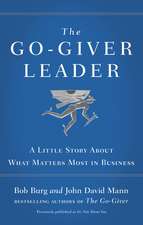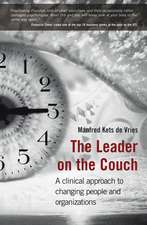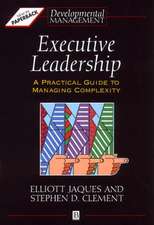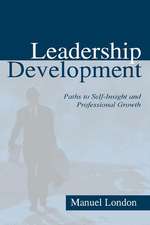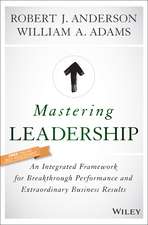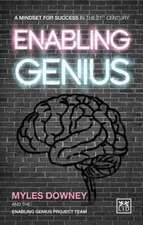Work Group Learning: Understanding, Improving and Assessing How Groups Learn in Organizations
Editat de Valerie Sessa, Manuel Londonen Limba Engleză Paperback – 14 dec 2007
This book will be of interest to all working in the area of group learning, including theoreticians, researchers or professional level practitioners who want a solid grounding in group learning theory and research. Students of organizational behavior will benefit from having the group learning literature brought together in a single volume with chapters from leading researchers.
| Toate formatele și edițiile | Preț | Express |
|---|---|---|
| Paperback (1) | 433.08 lei 6-8 săpt. | |
| Taylor & Francis – 14 dec 2007 | 433.08 lei 6-8 săpt. | |
| Hardback (1) | 1118.67 lei 6-8 săpt. | |
| Taylor & Francis – 14 dec 2007 | 1118.67 lei 6-8 săpt. |
Preț: 433.08 lei
Preț vechi: 509.51 lei
-15% Nou
Puncte Express: 650
Preț estimativ în valută:
82.87€ • 88.62$ • 69.10£
82.87€ • 88.62$ • 69.10£
Carte tipărită la comandă
Livrare economică 17 aprilie-01 mai
Preluare comenzi: 021 569.72.76
Specificații
ISBN-13: 9780805860221
ISBN-10: 0805860223
Pagini: 464
Dimensiuni: 152 x 229 x 24 mm
Greutate: 0.62 kg
Ediția:1
Editura: Taylor & Francis
Colecția Psychology Press
Locul publicării:Oxford, United Kingdom
ISBN-10: 0805860223
Pagini: 464
Dimensiuni: 152 x 229 x 24 mm
Greutate: 0.62 kg
Ediția:1
Editura: Taylor & Francis
Colecția Psychology Press
Locul publicării:Oxford, United Kingdom
Public țintă
ProfessionalRecenzii
“The volume looks great! It represents an advance to the field by integrating previouslyn disparate ideas around this common theme. It will be a good contribution to the fields of training, management, and organizational development. To my knowledge, there is no book like this that looks at the process of continuous learning in the diversity the authors present here.” - Allan Clardy, Towson University, USA
The purpose of this book is not just to describe how organizations can promote continuous learning in their employees; they want to integrate literature on individual, group, and organizational learning. A distinctive feature of this book is the authors’ use of a panel of subject-matter experts (SMEs) on the topic of continuous learning. Sessa and London make a strong case for the importance of continuous learning at the individual, group and organizational levels. Without this learning, the organization, like the shark, will die.” - PSYCCRITIQUES
"This is a wonderfully comprehensive and readable compendium of recent research on group learning. The authors - recognized experts in the field - have contributed a complementary set of chapters that cover the key issues on this increasingly important topic." - Amy Edmondson, Harvard Business School, USA
The purpose of this book is not just to describe how organizations can promote continuous learning in their employees; they want to integrate literature on individual, group, and organizational learning. A distinctive feature of this book is the authors’ use of a panel of subject-matter experts (SMEs) on the topic of continuous learning. Sessa and London make a strong case for the importance of continuous learning at the individual, group and organizational levels. Without this learning, the organization, like the shark, will die.” - PSYCCRITIQUES
"This is a wonderfully comprehensive and readable compendium of recent research on group learning. The authors - recognized experts in the field - have contributed a complementary set of chapters that cover the key issues on this increasingly important topic." - Amy Edmondson, Harvard Business School, USA
Cuprins
Preface. Part 1. How Groups Learn and What They Learn. V.I. Sessa, M. London, Group Learning: An Introduction. S.W.J. Kozlowski, B.S. Bell, Team Learning, Development, and Adaptation. H. Arrow, J. Cook, Configuring and Reconfiguring Groups as Complex Learning Systems. R.S. Tindale, S. Stawiski, E. Jacobs, Shared Cognition and Group Learning. A.P.J. Ellis, C.O.L.H. Porter, S.A. Wolverton, Learning to Work Together: An Examination of Transactive Memory System Development in Teams.Part 2. Member, Group, and Organizational Factors Influencing Group Learning. K.A. Jehn, J. Rupert, Group Faultlines and Team Learning: How to Benefit from Different Perspectives. C.O.L.H. Porter, A Multilevel, Multiconceptualization Perspective of Goal Orientation in Teams. N. Zakaria, A. Amelinckx, D. Wilemon, Navigating Across Culture and Distance: Understanding Determinants of Global Virtual Team Performance. S.J. Zaccaro, K. Ely, M. Shuffler, The Leader's Role in Group Learning.Part 3. Learning Interventions. C.S. Burke, E. Salas, D. Diaz, The Role of Team Learning in Facilitating Team Adaptation Within Complex Environments: Tools and Strategies. E.A.J.A. Rouwette, J.A.M. Vennix, Team Learning on Messy Problems. D.P. Brandon, A.B. Hollingshead, Collaborative Knowledge and Training in Online Groups. J.A. Cannon-Bowers, C.A. Bowers, A. Sanchez, Using Synthetic Learning Environments to Train Teams. J. Silberstang, T. Diamante, Phased and Targeted Interventions: Improving Team Learning and Performance. Part 4. Assessment of Group Learning. K.C. Stagl, E. Salas, D.V. Day, Assessing Team Learning Outcomes: Improving Team Learning and Performance. T.L. Gessner, K.L. Langkamer, R.J. Klimoski, Research Designs for Assessing Group Learning.



